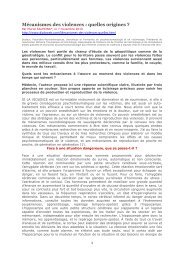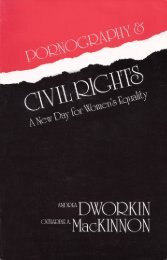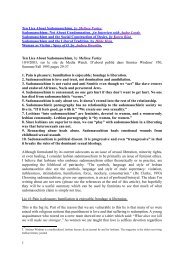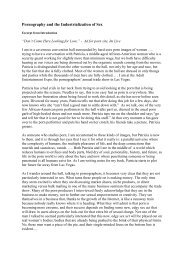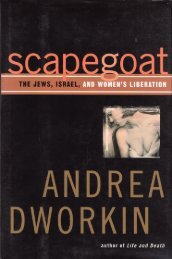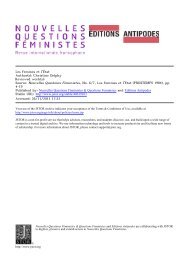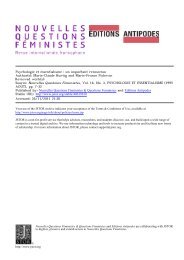The Industrial Vagina: The Political Economy of the Global Sex Trade
The Industrial Vagina: The Political Economy of the Global Sex Trade
The Industrial Vagina: The Political Economy of the Global Sex Trade
- No tags were found...
Create successful ePaper yourself
Turn your PDF publications into a flip-book with our unique Google optimized e-Paper software.
Feminists and <strong>the</strong> global sex industry 23Ano<strong>the</strong>r argument that Kapur makes is that prostitution is transgressive.This idea fits into <strong>the</strong> pro sexual freedom position <strong>of</strong> <strong>the</strong>new left which led to <strong>the</strong> promotion <strong>of</strong> pornography by those creating<strong>the</strong> 1960s and 1970s ‘counterculture’ (see Jeffreys, 1990/91).She argues that <strong>the</strong> correct approach for feminist <strong>the</strong>orists is,<strong>the</strong>refore, to ‘focus on moments <strong>of</strong> resistance’ and thus disrupt <strong>the</strong>‘linear narrative produced by <strong>the</strong> VAW [violence against women]campaigns’ and this will ‘complicate <strong>the</strong> binary <strong>of</strong> <strong>the</strong> West and<strong>the</strong> Rest’ (ibid., p. 29). She explains that she chooses to do this byforegrounding <strong>the</strong> ‘sex worker’ because ‘[h]er claims as a parent,entertainer, worker and sexual subject disrupt dominant sexual andfamilial norms. In post-colonial India, her repeated performancesalso challenge and alter dominant cultural norms. From her peripherallocation, <strong>the</strong> sex worker brings about a normative challengeby negotiating her disclaimed or marginalized identity within morestable and dominant discourses’ (ibid., p. 31). But <strong>the</strong> idea thatprostituted women transgress <strong>the</strong> social norms <strong>of</strong> heterosexualityand <strong>the</strong> heteropatriarchal family is by no means clear in India andPakistan, where forms <strong>of</strong> family prostitution thrive (Saeed, 2001;Agrawal, 2006b).In her research on family prostitution in Bombay in <strong>the</strong> 1920sand 1930s, Ashwini Tambe specifically refutes <strong>the</strong> notion that prostitutedwomen should be seen as transgressive (Tambe, 2006). Shestresses <strong>the</strong> continuities between families and bro<strong>the</strong>ls. She says thatfeminist <strong>the</strong>ory is wrong in always locating prostitution ‘outside<strong>the</strong> ambit <strong>of</strong> <strong>of</strong>ficial familial institutions’ (Tambe, 2006, p. 220).She criticizes <strong>the</strong> idea put forward by what she calls ‘sex radicals’that prostitution has <strong>the</strong> potential to ‘sever <strong>the</strong> link between sexand long-term intimacy and allow <strong>the</strong> performance <strong>of</strong> undomesticatedsexualities that challenge common prescriptions <strong>of</strong> femininepassivity’ (ibid., p. 221). What, she asks, ‘do we make <strong>of</strong> sexworkers who are, effectively, domesticated?’ (ibid., p. 221). Shecites national studies from India in <strong>the</strong> present that show that for32 per cent <strong>of</strong> prostituted women ‘kith and kin’ were responsiblefor <strong>the</strong>ir entry into prostitution, and that 82 per cent <strong>of</strong> prostitutedwomen in Bombay have and raise children in bro<strong>the</strong>ls.Precisely similar family structures exist in Calcutta’s bro<strong>the</strong>ls too,she points out. Many prostituted women remain in bro<strong>the</strong>ls because<strong>the</strong>y have been born <strong>the</strong>re. In her historical study she found thathusbands and mo<strong>the</strong>rs delivered girls and women to bro<strong>the</strong>ls.Bro<strong>the</strong>l keepers adopted maternal roles towards <strong>the</strong> girls delivered



